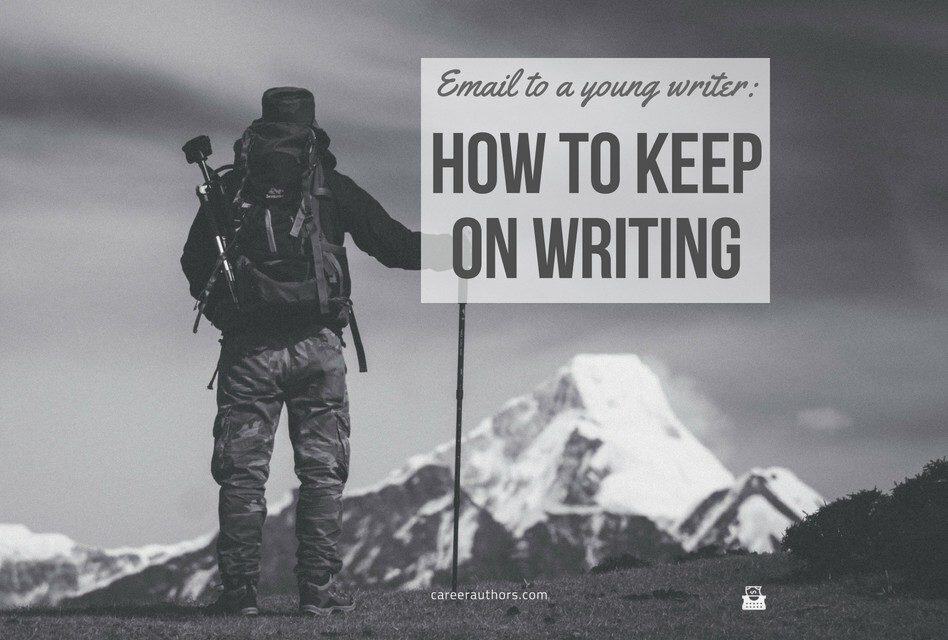As an agent, I get thousands and thousands and thousands of emails from writers. Mostly queries, but sometimes appeals for advice. Often these requests are for information the writers could have googled themselves in seconds, and those I mostly delete. But sometimes these communications are heartfelt pleas for guidance that move me to respond.
Today I received such a plaintive missive from a 15-year-old writer experiencing a painful crisis of confidence. (And no, I did not laugh. We were all fifteen once, and as I like to remind my adult children whenever they think I’m being lame, I’m really still a 14-year-old girl trapped in a middle-aged body.)
The gist of this teenage storyteller’s lament was this: He’d wanted to write a novel ever since he learned to read, but he was having trouble getting past the first chapter.
He read something I’d written about writing, and that had stopped him cold. Now he was asking me if he should just give up on the idea of being a writer altogether. Or keep on writing.
Uh-oh.
What did I say this time?
I had to look up the comment he was referring to, which I found in The Complete Handbook of Novel Writing, Third Edition (Writer’s Digest, 2016), in an excerpt from my book Writing with Quiet Hands, called The Taming of the Muse: Encouraging Inspiration Through Craft and Play:
The only reason to be a writer is because 1) you love writing; and/or 2) you couldn’t stop writing even if you tried—and you’ve already tried. If the latter applies to you, then you need to learn to enjoy the process. You need to make it fun. It needs to be fun. Or, at the very least, engrossing. That’s what inspiration is all about.
The long haul
The hardest thing about being a writer is the hardest thing about mastering any craft: It takes time. And it’s hard work. When I joined my first writer’s group, I was a punk in my twenties who’d sold my first story to Cosmopolitan at 19 and thought I was hot stuff. Then the most successful writer in our group, published many times over in most every format, told me with a stern stare that it took a million words to make a writer. I was about 950,000 words short. Oops.
I had to learn what every beginning writer needs to learn. To have fun writing, and to keep writing, even when it wasn’t so much fun.
Looking back over my life as a writer several decades later, I see that I suffered dry spells in which I found that impossible to do. But in the end the prolific writing spurts outweighed the no-writing dry spells. I wrote my million words, and more, and I published—and continue to publish—my work. The same is true for my clients.
Fun, ferocity, and friends
The Three Fs are what every writer needs for the long haul:
- Fun. Find a way to keep falling in love with the writing process, even when you hate it.
- Ferocity. When fun fails you, be fierce. Fierce about your commitment to your art. Fight your way back to fun.
- Friends. Keep company with other writers, congenial and generous and talented people who’ll share the journey with you. Who’ll believe in you when you don’t even believe in yourself. Who’ll push you when you need a good push. Or as the inimitable Hallie Ephron once told me, “Your problem is that you don’t finish.” She was right, and I knew it. In fact, now I preach it: The writers who get published are the ones who a) finish and b) revise.
Dear Young Writer
At 15, you have a lifetime of good writing ahead of you. It’s a practice, and you need to practice doing it. It should be fun, and you should have fun doing it. Don’t worry about getting published for a while.
Every writer needs the support of his tribe. Find a writers group, preferably one in your genre. There are even groups online you can join. Early in my career I joined Mystery Writers of America, and the California Writers Club, and other organizations. Where I made writer friends who still remain my friends today. We have all grown up as writers together, helping each other along the way. Supporting each other during tough times and celebrating during good times.
Whatever you do, do not give up. The fact that you are driven to write means that you are a writer, as long as you’re writing.
You might try writing shorter pieces first, before you tackle a novel. But there’s no reason you can’t write a novel; just take your time and understand that detours are part of the process. It takes as long as it takes.
Good luck!
Forget “no”
In answering this young writer, I’m reminded of that story about the young student of the violin who meets her hero, the best violinist in the world. She plays for him and asks if she has what it takes to be a violinist. He says, “no.” Years later, she meets him again, and tells him that his “no” prompted her to give up. “Then I was right,” he told her. “If you were a violinist, you would keep on playing, no matter what I said. No matter what anyone said.”
Keep on writing
Whether you’re fifteen or fifty, keep on writing. When in doubt, default to The Three Fs. Because the simple truth is this:
If you’re writing, you’re a writer.





